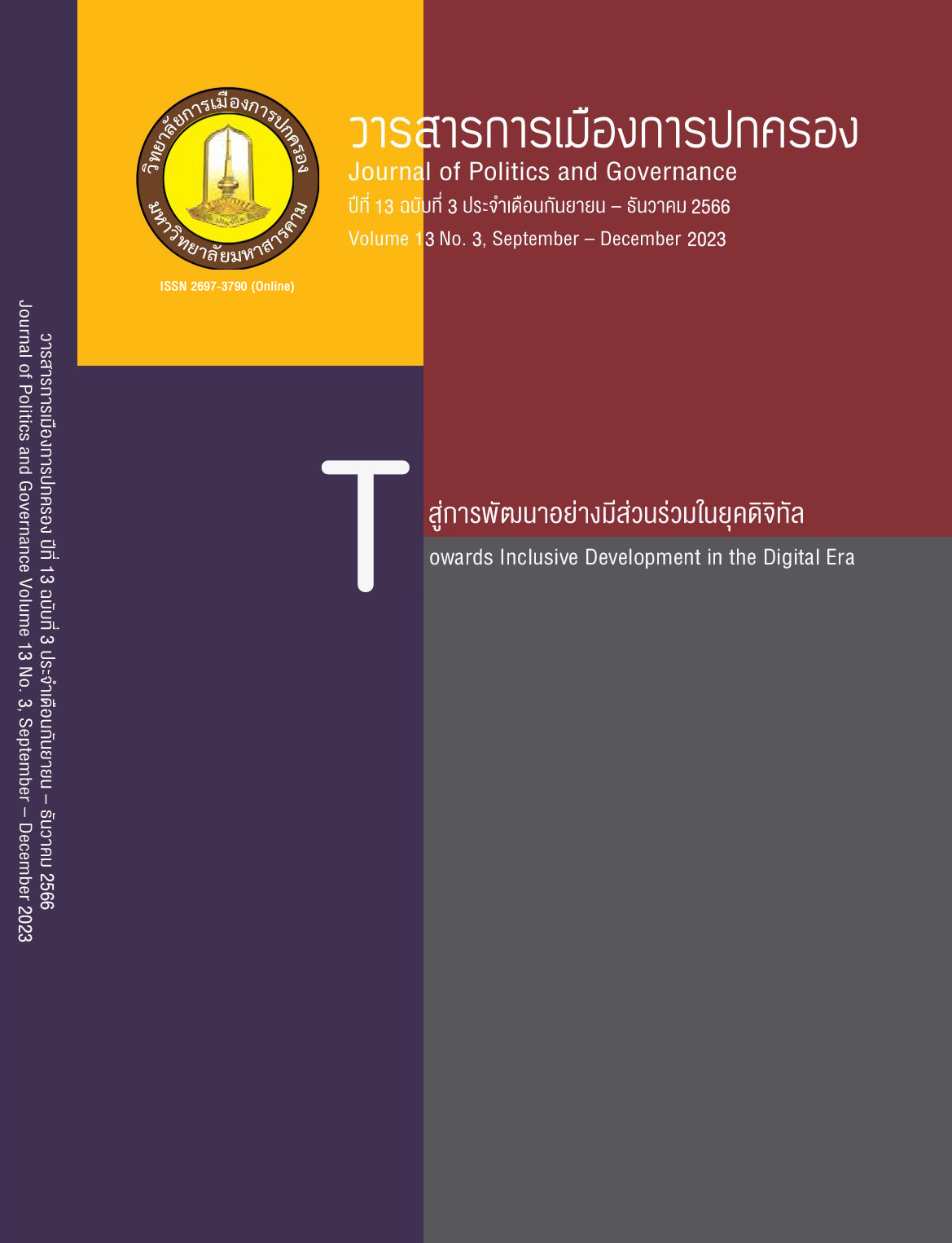ความผูกพันต่อองค์กรของลูกจ้างชั่วคราวมหาวิทยาลัยมหาสารคาม
Main Article Content
บทคัดย่อ
การวิจัยครั้งนี้มีวัตถุประสงค์เพื่อศึกษาระดับความผูกพันต่อองค์กร ปัจจัยที่ส่งผลต่อ ความผูกพันกับองค์กร และศึกษาแนวทางการสร้างความผูกพันต่อองค์กรของลูกจ้างชั่วคราวมหาวิทยาลัยมหาสารคาม โดยใช้วิธีการวิจัยแบบผสมผสาน เก็บรวบรวมข้อมูลโดยใช้แบบสอบถามจำนวน 304 ชุด จากลูกจ้างชั่วคราวมหาวิทยาลัยมหาสารคาม และแบบสัมภาษณ์จาก ลูกจ้างชั่วคราวมหาวิทยาลัยมหาสารคาม จำนวน 9 คน โดยการสุ่มตัวอย่างแบบง่าย วิเคราะห์ข้อมูลโดยการใช้โปรแกรมสําเร็จรูป SPSS ได้แก่ ค่าความถี่ ค่าร้อยละ ค่าเฉลี่ย และการสัมภาษณ์เชิงลึก (In-depth Interview) ชนิดมีโครงสร้าง และการวิเคราะห์เนื้อหาผลการวิจัย พบว่าระดับความผูกพันต่อองค์กรของลูกจ้างชั่วคราวมหาวิทยาลัยมหาสารคามภาพรวมอยู่ในระดับมาก มีค่าเฉลี่ย 4.12 ปัจจัยที่มีผลต่อความผูกพันต่อองค์กรของลูกจ้างชั่วคราวมหาวิทยาลัยมหาสารคาม ภาพรวมอยู่ในระดับมาก มีค่าเฉลี่ย 3.89 ปัจจัยที่มีผลต่อความผูกพันต่อองค์กรของลูกจ้างชั่วคราวมหาวิทยาลัยมหาสารคามมากที่สุด คือ ปัจจัยด้านเพื่อนร่วมงาน และแนวทางในการสร้างความผูกพันต่อองค์กรของลูกจ้างชั่วคราวมหาวิทยาลัยมหาสารคาม ได้แก่ การเพิ่มอัตราค่าจ้าง ค่าตอบแทน และสวัสดิการที่เหมาะสม, การเพิ่มความมั่นคงและความก้าวหน้าในงาน, การจัดการอบรม กิจกรรมสาธารณประโยชน์, และการสร้างแรงจูงใจในการทำงาน เพื่อเป็นขวัญและกำลังใจในการทำงาน ของลูกจ้างชั่วคราวมหาวิทยาลัยมหาสารคาม
Article Details

อนุญาตภายใต้เงื่อนไข Creative Commons Attribution-NonCommercial-NoDerivatives 4.0 International License.
เอกสารอ้างอิง
กาญจนา พันธ์ศรีทุม. (2559). อิทธิพลของปัจจัยด้านความยึดมั่นผูกพันในงานความผูกพันต่อองค์กรและความพึงพอใจในงานที่ส่งผลต่อความตั้งใจลาออกของพนักงานรัฐวิสาหกิจแห่งหนึ่ง. (วิทยานิพนธ์หลักสูตรศิลปศาสตรมหาบัณฑิต). สาขาวิชาจิตวิทยาอุตสาหกรรมและองค์การ คณะศิลปกรรมศาสตร์ มหาวิทยาลัยธรรมศาสตร์.
กองการเจ้าหน้าที่มหาวิทยาลัยมหาสารคาม. (2565). จำนวนลูกจ้างชั่วคราว/ข้อมูลทั่วไปของลูกจ้างชั่วคราว มหาวิทยาลัยมหาสารคาม. https://pd.msu.ac.th/pd7/.
จีรศักดิ์ โพกาวิน, และสุมิตร สุวรรณ. (2562). ปัจจัยและแนวทางการธำรงรักษาพนักงานมหาวิทยาลัยสายวิชาการในมหาวิทยาลัยของรัฐภาคตะวันออกเฉียงเหนือ. วารสารการเมืองการปกครอง, 8(1).
ณัฏฐพันธ์ เขจรนันทน์. (2551). พฤติกรรมองค์การ Organizational Behaviors. ซีเอ็ดยูเคชั่น.
ณัฐพงษ์ สุวรรณรัตน์. (2559). ปัจจัยที่มีผลต่อระดับความผูกพันของพนักงานในองค์กรกรณีศึกษาการประปานครหลวง. (สารนิพนธ์หลักสูตรรัฐประศาสนศาสตร์มหาบัณฑิต). มหาวิทยาลัยสยาม.
ทิพย์ชนก เสนผดุง. (2563). ปัจจัยที่มีผลต่อความผูกพันต่อองค์กรของบุคลากรกรมการข้าว. (สารนิพนธ์หลักสูตรปริญญารัฐประศาสนศาสตรมหาบัณฑิต). สาขาวิชารัฐประศาสนศาสตร์ ภาควิชารัฐประศาสนศาสตร์ คณะรัฐศาสตร์ จุฬาลงกรณ์มหาวิทยาลัย.
ธนนันท์ ทะสุใจ. (2547). ความผูกพันต่อองค์การของข้าราชการ สำนักศาลยุติธรรมประจำการ ภาค 5 . (ภาคนิพนธ์ศิลปศาสตรมหาบัณฑิต). สาขาพัฒนาสังคม คณะพัฒนาสังคมและสิ่งแวดล้อม สถาบันบัณฑิตพัฒนบริหารศาสตร์.
นิติพล ภูตะโชติ. (2559). พฤติกรรมองค์การ Organizational Behavior. สำนักพิมพ์แห่งจุฬาลงกรณ์มหาวิทยาลัย.
ยศพร ปัญจมะวัต. (2561). ความสุขในการทำงาน ความผูกพันต่อองค์กรและปัจจัยที่เกี่ยวข้องของพนักงานประจำ บริษัทแจ่มใสพับบลิชชิ่ง. (หลักสูตรปริญญาวิทยาศาสตรมหาบัณฑิต). สาขาวิชา สุขภาพจิต ภาควิชาจิตเวชศาสตร์ คณะแพทยศาสตร์ จุฬาลงกรณ์มหาวิทยาลัย.
รังสรรค์ ประเสริฐศรี. (2556). พฤติกรรมองค์การ Organizational Behavior. กรีนแอปเปิ้ล กราฟฟิก พริ้นติ้ง.
วชิรวัชร งามละม่อน. (2558). แนวคิดและทฤษฎีเกี่ยวกับความผูกพัน. https://learningofpublic. blogspot.com/2015/09/blog-post_44.html.
วิเชียร วิทยอุดม. (2556). พฤติกรรมองค์การ Organizational Behavior. ธนธัชการพิมพ์.
สุรเสกข์ ผลบุญ. (2558). วัฒนธรรมองค์การกับความผูกพันต่อองค์การ. https://bps.mcu.ac.th/wp-content/uploads/2017/06/G-
Buchanan, B. (1974). Building Organizational Commitment: The Socialization of Managers in Work Organizations. Administrative Science Quarterly, 19(4), 533-546.
Daft, Richard L. (2010). Organization Theory and Design. South-Western Cengage Laeaning.
Greenberg, Jerald. & Baron, Robert A. (2003). Behavior in Organizations (8th ed). Upper Saddle River, New Jersey Pearson Education.
Herbert, H. G. (1972). The Management of Organization: A Systems and Human Resources Approach (12th ed). Appletion-Century-Crofts.
Maslow, A. H. (1943). A theory of human motivation. Psychological Review, 50(4), 370–396.
Porter, L. W., & Steer, R. M. (1974). Organizational commitment job satisfaction and Turnover 286 among psychiatric technicians. Journal of Applied Psychology, 59, 603-609.
Salancik, G. R. (1983). Commitment and the Control of Organizational Behavior and Be life. In Psychological Foundations of Organizational Behavior (2nd ed). (pp.202-207) Edited by Barry M.Staw. n.p.
Steers, R. M. (1977). Antecedents and Outcomes of Organizational Commitment. Administrative Science Quarterly, 22, 28-124.


